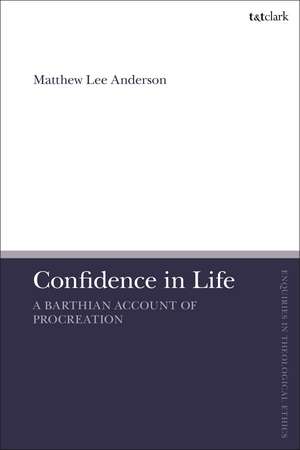Confidence in Life: A Barthian Account of Procreation: T&T Clark Enquiries in Theological Ethics
Autor Matthew Lee Andersonen Limba Engleză Hardback – 24 ian 2024
Din seria T&T Clark Enquiries in Theological Ethics
- 23%
 Preț: 192.01 lei
Preț: 192.01 lei - 30%
 Preț: 510.42 lei
Preț: 510.42 lei -
 Preț: 159.53 lei
Preț: 159.53 lei - 23%
 Preț: 193.45 lei
Preț: 193.45 lei - 30%
 Preț: 510.04 lei
Preț: 510.04 lei - 23%
 Preț: 196.96 lei
Preț: 196.96 lei - 23%
 Preț: 198.93 lei
Preț: 198.93 lei - 23%
 Preț: 192.19 lei
Preț: 192.19 lei - 23%
 Preț: 190.68 lei
Preț: 190.68 lei - 13%
 Preț: 230.33 lei
Preț: 230.33 lei - 30%
 Preț: 511.40 lei
Preț: 511.40 lei - 22%
 Preț: 224.66 lei
Preț: 224.66 lei - 23%
 Preț: 191.92 lei
Preț: 191.92 lei - 30%
 Preț: 511.72 lei
Preț: 511.72 lei - 23%
 Preț: 222.93 lei
Preț: 222.93 lei - 22%
 Preț: 230.43 lei
Preț: 230.43 lei - 14%
 Preț: 542.02 lei
Preț: 542.02 lei - 22%
 Preț: 237.10 lei
Preț: 237.10 lei - 21%
 Preț: 215.88 lei
Preț: 215.88 lei - 23%
 Preț: 191.22 lei
Preț: 191.22 lei - 22%
 Preț: 231.63 lei
Preț: 231.63 lei - 28%
 Preț: 466.05 lei
Preț: 466.05 lei - 22%
 Preț: 240.68 lei
Preț: 240.68 lei - 30%
 Preț: 539.42 lei
Preț: 539.42 lei - 24%
 Preț: 196.54 lei
Preț: 196.54 lei - 30%
 Preț: 597.87 lei
Preț: 597.87 lei - 30%
 Preț: 510.99 lei
Preț: 510.99 lei - 22%
 Preț: 231.89 lei
Preț: 231.89 lei - 21%
 Preț: 218.09 lei
Preț: 218.09 lei
Preț: 511.40 lei
Preț vechi: 731.77 lei
-30% Nou
Puncte Express: 767
Preț estimativ în valută:
97.87€ • 101.91$ • 82.71£
97.87€ • 101.91$ • 82.71£
Carte tipărită la comandă
Livrare economică 10-24 martie
Preluare comenzi: 021 569.72.76
Specificații
ISBN-13: 9780567710635
ISBN-10: 0567710637
Pagini: 272
Dimensiuni: 156 x 234 mm
Greutate: 0.56 kg
Editura: Bloomsbury Publishing
Colecția T&T Clark
Seria T&T Clark Enquiries in Theological Ethics
Locul publicării:London, United Kingdom
ISBN-10: 0567710637
Pagini: 272
Dimensiuni: 156 x 234 mm
Greutate: 0.56 kg
Editura: Bloomsbury Publishing
Colecția T&T Clark
Seria T&T Clark Enquiries in Theological Ethics
Locul publicării:London, United Kingdom
Caracteristici
Offers a creative and constructive reading of Karl Barth's theological ethics which foregrounds themes that have sometimes been neglected or minimized by his English-speaking interpreters
Notă biografică
Matthew Lee Anderson is Assistant Professor in the Honors College at Baylor University, USA.
Cuprins
IntroductionChapter One: (Procreative) Neutrality is Not EnoughChapter Two: Parenthood and Procreative Bonds Chapter Three: The "Gift of Life": Luck, the Involuntary, and Procreative AgencyChapter Four: Neither Optimism nor Pessimism: Karl Barth Among the Moral PhilosophersChapter Five: Birth Between the Times: Procreation in the Doctrine of CreationChapter Six: Respect for Life as a Reason to CreateChapter Seven: Mary and the Eschatological Confirmation of Procreative BondsChapter Eight: Honour, Agency, and Reasons to ProcreateConclusion:The Meaning of Procreative FideismBibliographyIndex
Recenzii
In the face of the threats of climate change, population growth, and mass migration, the issue of whether to have children, and why, is rising in salience not only in academic philosophy, but also in wider popular discourse. In his book Matthew Anderson brings a searching intelligence, analytical tenacity, lucid thinking, and a lively pen to the task of working out a thoroughly theological response to the question, and one that counters 'procreative pessimism' with Christian hope. This is a work of unusually high intellectual caliber.
This timely, insightful, and engaging study is a superb contribution to the current engagement of Barth with contemporary issues. Anderson convincingly shows how Barth's theology supports an affirmative answer to the strange but pressing questions of whether human beings should procreate, and if so, why. The penetrating analyses of the philosophical arguments for and against procreation, the splendid treatment of Barth's Mariology, and the bold but compelling case for a pronatalist Barth make this book a must-read for anyone interested in Barth's ethics or the ethics of procreation.
Matthew Lee Anderson's Confidence in Life is a much-needed work focused on issues related to procreation, parenthood, and the family. Anderson's engagement with recent philosophical work coupled with theology from Barth and others is a unique and helpful approach. Philosophers and theologians interested in issues surrounding procreation, pro-natalism, anti-natalism, and parenthood will find much of interest in this excellent book.
This timely, insightful, and engaging study is a superb contribution to the current engagement of Barth with contemporary issues. Anderson convincingly shows how Barth's theology supports an affirmative answer to the strange but pressing questions of whether human beings should procreate, and if so, why. The penetrating analyses of the philosophical arguments for and against procreation, the splendid treatment of Barth's Mariology, and the bold but compelling case for a pronatalist Barth make this book a must-read for anyone interested in Barth's ethics or the ethics of procreation.
Matthew Lee Anderson's Confidence in Life is a much-needed work focused on issues related to procreation, parenthood, and the family. Anderson's engagement with recent philosophical work coupled with theology from Barth and others is a unique and helpful approach. Philosophers and theologians interested in issues surrounding procreation, pro-natalism, anti-natalism, and parenthood will find much of interest in this excellent book.
